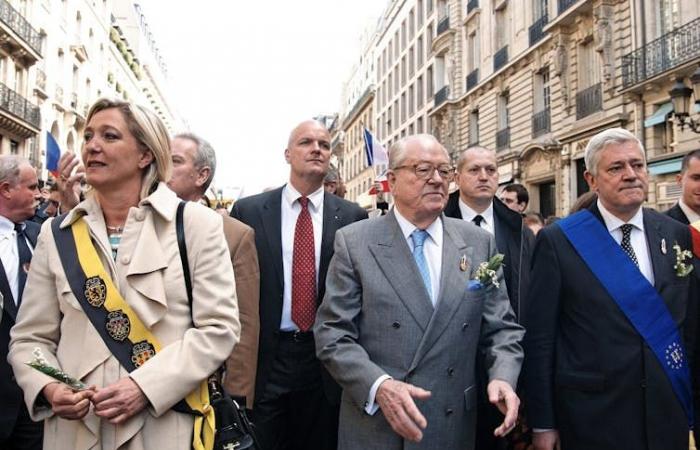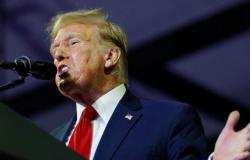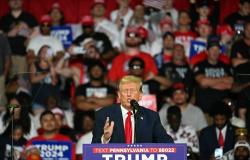While the National Rally (RN) is at the top of the voting intention polls for the legislative elections, Safia Dahani, who co-edited the work Political Sociology of the National Rally (Presses universitaire Septentrion), returns to the legitimation processes of the far right and in particular of its main formation, the RN.
The strategy of demonizing the National Rally seems to have worked. Is this the only strategy that has proven effective in recent years?
“Demonization” covers a set of very contrasting realities. This may refer to particular communications policies. For example, getting rid of the (a priori negative) image of a far-right party created by former collaborators of the Nazi regime, or even distancing one of its founders, Jean-Marie Le Pen in as a historical figure known for his racist and anti-Semitic remarks.
This also refers to putative forms of professionalization of the organization with the recruitment of managers deemed competent, and another division of labor in internal administrative services.
But it can also and above all refer to dynamics at the border or outside the organization. I believe that the keys to understanding the legitimization of the far right (voting, activism, etc.) also lie in these spaces: both on the side of other parties and political professionals and on the side of the media space. .
On the one hand, and current events confirm this, the occasional rallies of former right-wing executives since the 2010s (Julien Odoul, Sébastien Chenu, Franck Allisio, etc.) have contributed to the legitimization of the far right.
The rallying of Eric Ciotti is the latest example.
It must also be said that the government favored the access of RN deputies to important responsibilities in the National Assembly, such as vice-presidents for example, and organized debates with representatives of the extreme right, which participated in the construction of the FN-RN as one of the main opposition parties.
[Déjà plus de 120 000 abonnements aux newsletters The Conversation. Et vous ? Abonnez-vous aujourd’hui pour mieux comprendre les grands enjeux du monde.]
On the other hand, we must ask ourselves the question of the privileged journalistic framings (on private and public channels) to speak and make the FN-RN speak. In recent years, these framings have bifurcated: from the extreme right to the “national right”, “nationalist right” or “populist right”. At the same time, Marine Le Pen has been “too much” and “too soon” in the media with regard to her objective position (president of a party which had, before 2022, no MP).
The media also participated in highlighting the fads of the far right: immigration, Islam, national identity. They mobilized the words of the far right to tell the world: “Great Replacement, paper French, focus on African immigration or Muslim immigration”.
They regularly invited spokespersons for the extreme right without offering any scientific or historical clarification.
In doing so, even in a morning radio show on France Culture, talking about the racism which motivates the RN vote is now the subject of outcry from political journalists. According to the latter, we should then speak of “cultural insecurity” or aporias in terms of the handling of “security” issues by other partisan groups.
We can also recall the opening speech by José Gonzalez, RN deputy and dean of the National Assembly, which was no more shocking than that, even though he had expressly referred to French Algeria.
These clues, in the absence of significant scientific work on these questions, then also push us to look at the fringes of the party, and at the journalistic level in particular, to explain and thus understand the way in which an extreme right party can appear, today and for many more “republican” than others, particularly on the left.
Also read: How do we recognize a totalitarian or fascist speech?
The figure of Jordan Bardella was particularly highlighted during the European campaign. However, his performances in the debates were considered rather poor, without this affecting his popularity. How do you explain it?
We must first return to the “effects” of televised debates which are very often not those we believe. It is a scientific challenge to think that everyone watches political debates on television and that everyone watches them in the same way, with the same expectations, the same instruments for judging politics and its professionals. The sociologist Patrick Champagne already alerted us to the importance of the discourse surrounding these media rites and to the immutable question of “Who won”, in reality very far from the “ordinary” reading grids of such a television program, even though it was so important for professionals in politics and the media.
Joel Saget/AFP
Thinking that we have “won” a debate against a representative of the extreme right because we think we have shown his flaws in terms of “competence” is an error, or in any case a scientifically difficult fact to note or objectivize. This interpretation of political exchanges on television is far from that of viewers in general. The debates do not drastically change voting intentions or political opinions. They are viewed in an “oblique” way, favoring the reading grids already present in the minds of the public.
I also add that a prime minister who organizes a face-to-face debate with a single head of the list (from the far right) poses another question: that of a transfer of legitimacy. If Jordan Bardella was not a political professional worthy of the name, why would a prime minister take the time to debate at length with him on a television set, on public service, in the early part of the evening?
We must then remember that the FN-RN is a very undemocratic party internally. Centralized around a court society linked to Le Pen, this party does not really leave room for trends or currents, whose room for maneuver is limited.
These internal currents do exist, but they are expressed very little. Generally, when speeches going against the party’s main line are heard, the executives who carry them do so at a loss (positions of power, elected mandates) and with great risks of exclusion. What must be understood is that the FN-RN urges us to follow “a line” (that of the boss) and puts partisan disloyalties at risk of exit, especially during electoral times. In other words, the FN-RN knows how to put itself in working order, to “stand together”.
What are the significant sociological developments that you have noted in terms of activism during your fieldwork, and how do they differ depending on the territory?
On the one hand, it must be remembered that in the 2010s the FN-RN was a party relatively poorly established throughout the territories. What is striking are electoral dynamics which operate without any particular work, without any mobilization effort.
In Paris for example, in a territory in which the FN-RN never managed to establish itself electorally, I was able to observe a “failed” campaign: candidates chosen at the last minute and unknown to the activists (already few in number ), electoral propaganda unavailable in time for mobilization, refusal of local supervisors to continue the campaign after nomination of a candidate deemed unsuitable…
Marie-Lan Nguyen, CC BY-ND
On the other hand, I observed that the party, occasionally and in certain federations, such as in the center of France, sometimes sends new leaders to the departments who will take their mission very seriously and fight the campaign in outside of electoral times, in order to bring back to them a large part of the members who had been abandoned by their predecessors.
But these cases are, in my opinion, very limited and they were able, at the end of the 2010s, to benefit from the support of local activists from other parties (notably from the right), motivated by the opening of the job market. locals within the RN, in which activist and professional careers were then quicker and more accessible than in other right-wing groups.
Then, we can point out that the FN-RN was trying at the time to motivate its troops by organizing “federation tournaments”: in Fréjus in 2017, the party awarded a trophy to a leader who had most increased the number of members of his department.
This data on the evolution of the federations is also published internally in a note intended for executives, very regularly, with the aim of “motivating the troops”.
However, it must be remembered: the federations are still managed from the center of the party, there are numerous airdrops at their heads and there is a significant turnover of departmental secretaries.
Finally, and it must be said forcefully: what I noted was also a pacification of the public space in the face of representatives of the FN-RN. I have observed very few particular demonstrations in front of the places of public meetings or meetings or signs of hostility during leaflets in the markets for example. In fact, RN activists and executives did not feel in great danger on the ground. This is a significant mark of the legitimization of this far-right vote in the public space.
The effort to show a “normal” and “popular” party tends to make us forget the bases of a very “thoughtful” and old ideology, but who and where are the ideologues of the RN, and how do their ideas infuse?
Concerning the ideologues marked “FN-RN”, it is difficult to say. There are many programmatic action committees whose “work” is difficult to locate; there have been collectives which have produced program elements.
On this point, we must instead turn to the party borders or the far-right groups which are not systematically “included” FN-RN: far-right clubs and think tanks, a “free and independent” press. far-right online and in print.
Also read: Public denunciation, a characteristic of populist speeches?
More recently, we can also note the support of a professional pollster, Jérome Sainte-Marie, who frequents TV sets with the dual role of “politics expert” and director of the FN training institute. RN. But an in-depth investigation should be carried out on the Héméra campus and its audiences…
Finally, on the place of “ideas”, we must pay attention to those who carry them and in what contexts. At the FN-RN, to study the ideological mutations of the party, we can first look at the programs, which already say a lot about worldviews centered on an “internal enemy”, on the dangers of “Islamism » with regard to a naturalized and imagined “French identity”.
They also say a lot about differentialism and social inequalities which are related to natural inequalities.
But we must also look, in a particular way, at the side of each group which mobilizes for and in the name of the FN-RN. During my investigation, some people pay attention to certain “ideas” more than others. I met (young) readers of Charles Maurras, traditionalist Catholics who are big readers of conspiratorial works, but also others who did not know this whole ideological, intellectual and theoretical apparatus very well, which did not prevent them from be entirely consistent with national preference and “France for the French”.







